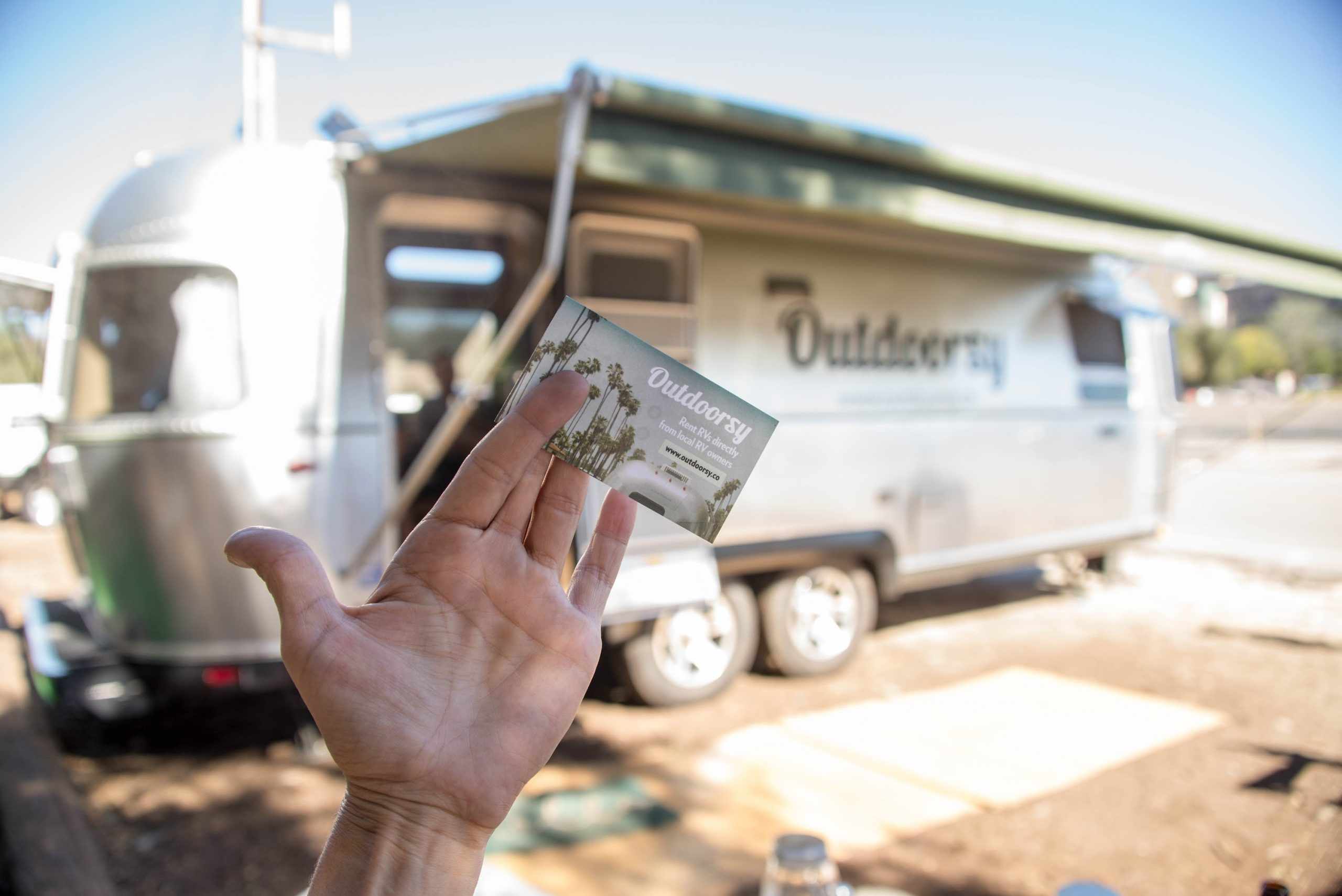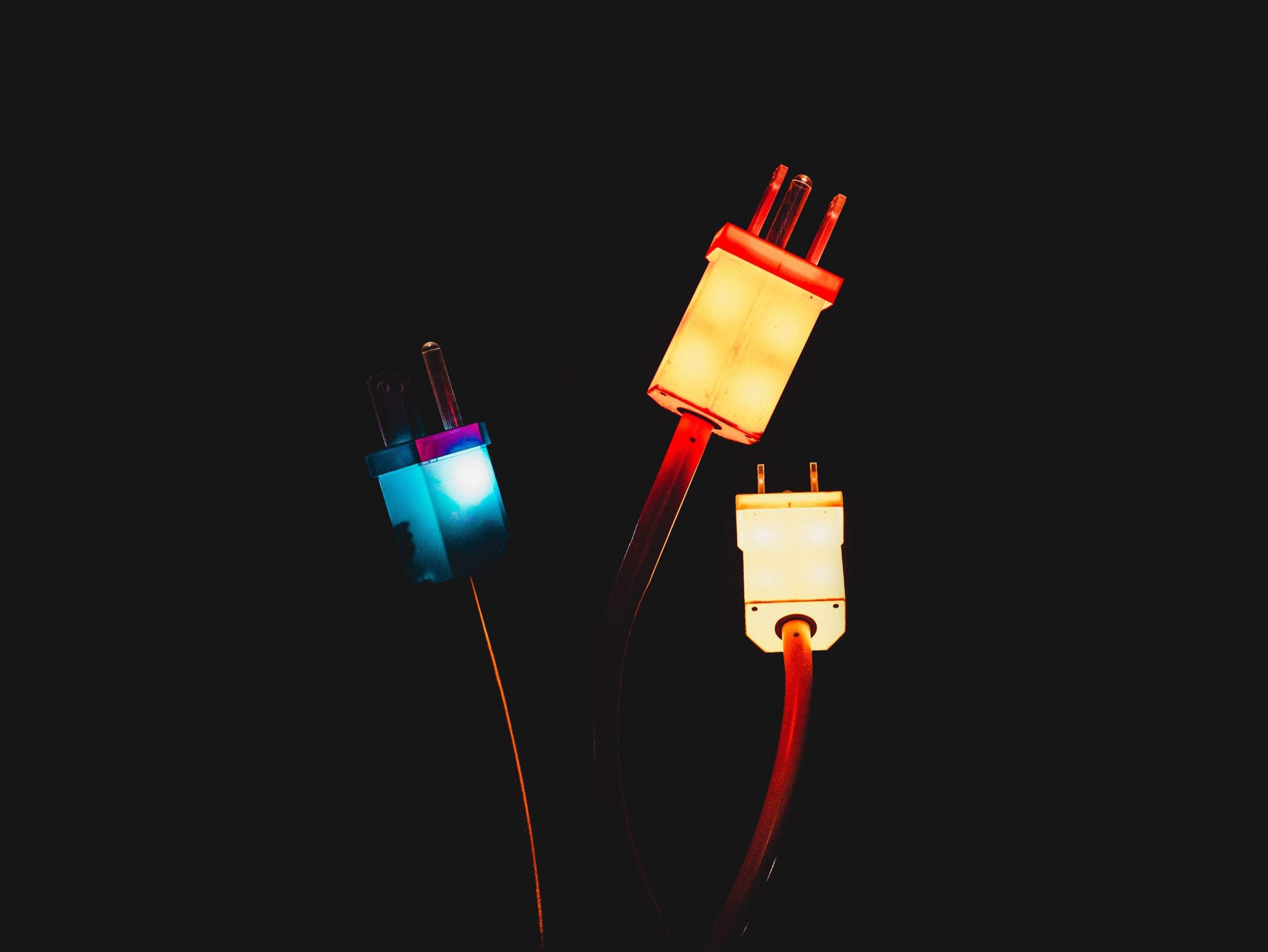Whether at a cushy campsite with all the amenities, boondocking hundreds of miles from civilization, or anywhere in between, your RV’s electrical system will likely play a role in your camping experience. Electricity, whether from a campsite hook-up or batteries onboard your RV, will power everything inside your rig— lights, entertainment, appliances, and more. The inverter is a system component that allows you to use everything in your RV, no matter what power you can access.
RVs For Rent Near You

In this article, we’ll cover the basics of inverters, including what they are, how to use them, and where you can find a good one to purchase for your RV.
What is an RV inverter?
To understand what an inverter is, there are a few RV electricity basics you should know about. Your RV is likely equipped to handle two types of power:
- AC power: Alternating current systems in RVs resemble the system you’d find in your home. This is the 120-volt power that travels via power lines and comes in through your outlets. This powers anything you plug in, such as appliances.
- DC power: Direct current power, on the other hand, is what is stored in batteries and runs at a much lower 12-volts. On an RV, your water pump, lights, and fans typically run on DC power. Appliances typically do not run on DC power.
You’ll get AC power to your RV only if you’re connected to shore power or a generator. This means that when you’re at a campsite off-grid without a generator, your electrical capabilities are a little different than if you’re at a campsite with hookups.
An inverter, however, allows you to utilize your appliances, even when you’re not hooked up to shore or generator power. It does this by taking 12-volt DC power from your RV deep-cycle batteries and inverting it to 120-volt AC power. This makes it a crucial part of your electrical setup, especially if you plan on dry camping or utilizing solar power.
NOTE: You may have also heard about an RV converter. A converter is a separate device that may be on your RV and turns AC power into DC power for your fans, lights, and pumps. Never run your inverter and converter on at the same time. Doing so will simply drain your batteries.
Types of RV Power Inverters
There are two main types of inverters on the market today:
- pure sine wave
- modified sine wave inverters.
When inverters first came out, they were modified sine wave inverters. We won’t get into all the physics behind it, but modified sine wave inverters transform the DC power to AC power by creating a blocky electric signal. As technology has advanced, pure sine wave inverters have been able to transform the power into a smooth, almost-perfect sine wave that more closely resembles what comes through our utilities.
Modified sine wave inverters are less expensive, but they are also less compatible with today’s technology and appliances. Pure sine wave inverters produce electricity that is cleaner, smoother, quieter, and more efficient than modified inverters.
If you plan on powering any of the following, you’ll want to spend the extra money on a pure sine wave inverter.
- Newer TVs
- Appliances with AC motors like refrigerators and microwaves
- Appliances with digital clocks or electronic timers
- CFL light bulbs
- Sensitive medical equipment
Still, you can get by with running a modified inverter if you are only planning on running the simplest of electric systems, like an old CRT TV or water pumps. Anything more, and you might start running into issues.
Choosing the Right RV Inverter

When choosing the right RV inverter, you’ll want to consider a few things.
Type of inverter
We’ve already covered this, but first, you’ll want to decide whether you’re going to need a pure sine wave inverter or a modified sine wave inverter.
Power rating
Once you decide on the type of inverter, consider the power capacity. What you’ll need depends on what you’ll use in your RV.
Inverters are rated in watts. Electrical appliances and devices have a corresponding rating. You can determine watts by multiplying the number of amps that an appliance requires by 120. An Inverter Calculator such as the one found here can also help you determine how many watts your inverter will need to handle. Don’t forget to account for appliances or things you may power all at once!
May RVs get by just fine on inverters rated between 2000 and 4000 watts. However, keep in mind that power-hungry appliances— such as the air conditioner— may struggle to be powered by batteries.
Input and Output Voltage
Your input voltage should match your RV’s battery— which should be 12V. The output voltage should be 120V for most locations in North America. You’ll want to double-check this, especially if buying online as other countries operate on different voltages.
Best RV Inverters
Not sure where to start your RV inverter search? Here are some of the best power inverters for RVs based on user reviews:
- AIMS Power 2000 Watt Pure Sine Inverter
- AIMS 5000 Watt Modified Sine Wave Inverter
- Power TechON 3000 Watt Pure Sine Wave Inverter
- Go Power! 3000-Watt Pure Sine Wave Inverter
How to Use an RV Inverter
Using an inverter is easy! Once you have everything installed (which is also pretty simple and can be guided by manufacturer’s instructions or a DIY video on YouTube) most inverters work by simply flipping a switch on when you’re ready to use your batteries.
As with anything in an RV, it’s super important to read any manuals or instructions that come with your RV or any equipment you purchase. While everything generally operates the same, there are small differences that you should be aware of.
RV Inverter Troubleshooting
When your RV inverter isn’t working as expected, it can be frustrating, but many issues can be resolved with a little troubleshooting. Here’s a step-by-step guide to help you diagnose and fix common inverter problems:
Inverter Won’t Power On
Possible Causes:
- Battery Issues: The inverter relies on the RV’s battery for power. Ensure the battery is charged and connected properly.
- Blown Fuse: Check for a blown fuse or tripped circuit breaker.
- Faulty On/Off Switch: The inverter’s switch may be faulty, so try toggling it a few times or inspecting it for damage.
Solutions:
- Check battery voltage; it should be within the operating range of your inverter.
- Inspect fuses and breakers for damage and replace as needed.
- Test the inverter’s switch and consider contacting the manufacturer if the issue persists.
Inverter Shuts Down After a Few Minutes
Possible Causes:
- Overload: The inverter may be attempting to power too many appliances at once, drawing more power than it can handle.
- Overheating: Inverters have built-in safety mechanisms to shut down when they overheat.
- Battery Voltage Drops: If the battery voltage gets too low, the inverter will automatically shut off to prevent damage.
Solutions:
- Disconnect some appliances to reduce the load and prevent overloading.
- Ensure proper ventilation around the inverter to avoid overheating.
- Check the battery voltage and recharge if necessary.
Inverter Produces Low or No AC Power
Possible Causes:
- Loose or Damaged Wiring: Connections between the inverter and the appliances may be loose or corroded.
- Faulty Inverter: Internal components, like the capacitor or circuit board, may have failed.
- Inverter Settings: Some inverters have settings for different loads or power outputs; ensure they are configured correctly.
Solutions:
- Inspect all wiring and connections, tightening or replacing any that are damaged.
- If the inverter shows signs of internal failure, it may need professional repair or replacement.
- Review the inverter’s settings and adjust according to the manufacturer’s recommendations.
Inverter Produces a Humming or Buzzing Noise
Possible Causes:
- Loose Components: Loose internal parts or connections may cause vibrations or noise.
- Electromagnetic Interference: Inverters sometimes emit electromagnetic fields that can interfere with nearby electronics, creating a buzzing sound.
Solutions:
- Tighten any loose screws or components.
- If the noise persists, consider relocating sensitive devices away from the inverter or using shielding to reduce electromagnetic interference.
Inverter Shows Error Codes or Warning Lights
Possible Causes:
- Overload or Short Circuit: Some inverters have built-in error detection for overloads or short circuits.
- Low Battery Voltage: Many inverters will display an error code if the battery voltage is too low.
Solutions:
- Check the user manual for the error code to determine the specific issue.
- Ensure the battery is fully charged and the inverter is not overloaded. Reset the inverter if necessary.
Inverter Is Not Charging the Battery
Possible Causes:
- Faulty Charging Circuit: If the inverter has a built-in charger, a malfunctioning charging circuit could prevent it from charging the battery.
- Incorrect Battery Type or Size: Ensure the inverter is compatible with the battery type and size you’re using.
Solutions:
- Test the charging function with a multimeter to check the output voltage.
- If the inverter has a separate charger, check its connections and fuse.
- Verify the battery is the correct type for the inverter and check its condition.
Inverter Making Strange Smells or Overheating
Possible Causes:
- Internal Component Damage: Overheating can damage internal components, causing burnt smells or even smoke.
- Overload or Poor Ventilation: Too many appliances running at once or inadequate ventilation can cause the inverter to overheat.
Solutions:
- Turn off the inverter immediately and let it cool down.
- Inspect the inverter for any signs of internal damage. If there’s burning or melted components, the inverter may need to be replaced.
- Ensure the inverter is well-ventilated and not placed in an enclosed space with poor airflow.
General Maintenance Tips
- Regularly check battery health and keep it charged to avoid strain on the inverter.
- Clean the inverter of dust and debris to maintain optimal cooling.
- Inspect wiring and connections for corrosion or wear, especially after heavy use.
If you continue to experience issues, consider contacting a professional for repairs or replacement, as certain problems might require specialized tools and expertise.
RV Inverter FAQ
What’s the difference between a pure sine wave inverter and a modified sine wave inverter?
- Pure Sine Wave Inverter: Produces a smooth, clean waveform that mimics the power supplied by electric utilities, making it ideal for sensitive electronics like computers and medical equipment.
- Modified Sine Wave Inverter: Generates a rougher waveform and is generally less expensive. It’s suitable for simple appliances but may cause interference or damage to sensitive electronics.
Can I run my air conditioner with an RV inverter?
Running an air conditioner (AC) with an inverter depends on the size of your RV’s inverter and the air conditioner’s power requirements. AC units are typically high-wattage appliances, often requiring 2000W or more, so a larger inverter (at least 3000W or more) would be necessary. Keep in mind that your battery system would also need to support the demand.
How do I install an RV inverter?
Installing an RV inverter involves connecting it to the RV’s battery system and ensuring it’s safely mounted. While the process can vary by inverter model, it typically includes:
- Choosing an installation location with adequate ventilation.
- Connecting the DC terminals to the battery.
- Connecting the AC terminals to your RV’s power distribution system.
If you’re not familiar with electrical systems, it’s best to have a professional handle the installation.
How long will an inverter run on battery power?
The duration an inverter can run on battery power depends on several factors, including the inverter’s wattage, the capacity of your battery bank, and the power consumption of the devices you’re running. For example, an inverter running low-wattage devices might last for several hours, while high-wattage appliances like air conditioners will drain the battery much faster.
Can I use my RV inverter while driving?
Yes, most RV inverters can work while the vehicle is in motion, as long as the inverter is connected to the battery system and the engine alternator is charging the battery. However, using high-power appliances while driving can quickly deplete your battery, especially if you’re not connected to shore power or have limited solar or charging capabilities.
What are the signs that my RV inverter is failing?
Signs that your RV inverter might be failing include:
- No power output: The inverter doesn’t power appliances even though it’s on.
- Unusual noises: Humming or buzzing sounds may indicate internal issues.
- Error codes or warning lights: Many inverters display error codes if there’s a malfunction.
- Overheating: If the inverter becomes excessively hot or shuts down frequently, it may be malfunctioning.
Can I use a generator with an inverter?
Yes, you can use an inverter with a generator. In fact, using a generator to charge your RV’s battery bank or directly power appliances while the inverter converts DC to AC power can be an efficient setup, especially for off-grid trips.
Powering the Fun
Your RV or motorhome inverter keeps the power and fun flowing, even when you’re not connected to shore power. By inverting the power from your batteries to AC, you can power almost anything in your RV using your batteries and/or solar panels. You’ll want to be sure to pick the right one, however, as not all inverters are created equal. Use this article to guide your search so you can help your renters get on the road and stay on the road!








